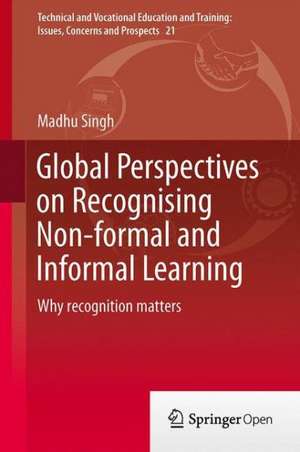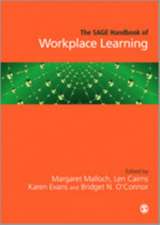Global Perspectives on Recognising Non-formal and Informal Learning: Why Recognition Matters: Technical and Vocational Education and Training: Issues, Concerns and Prospects, cartea 21
Autor Madhu Singhen Limba Engleză Hardback – 25 iun 2015
| Toate formatele și edițiile | Preț | Express |
|---|---|---|
| Paperback (1) | 418.29 lei 43-57 zile | |
| Springer International Publishing – 17 oct 2016 | 418.29 lei 43-57 zile | |
| Hardback (1) | 425.58 lei 43-57 zile | |
| Springer International Publishing – 25 iun 2015 | 425.58 lei 43-57 zile |
Din seria Technical and Vocational Education and Training: Issues, Concerns and Prospects
- 24%
 Preț: 679.96 lei
Preț: 679.96 lei - 18%
 Preț: 955.56 lei
Preț: 955.56 lei - 15%
 Preț: 642.83 lei
Preț: 642.83 lei - 15%
 Preț: 636.30 lei
Preț: 636.30 lei - 15%
 Preț: 636.12 lei
Preț: 636.12 lei - 20%
 Preț: 559.99 lei
Preț: 559.99 lei - 15%
 Preț: 640.55 lei
Preț: 640.55 lei - 15%
 Preț: 640.06 lei
Preț: 640.06 lei - 20%
 Preț: 551.57 lei
Preț: 551.57 lei - 15%
 Preț: 638.11 lei
Preț: 638.11 lei - 15%
 Preț: 649.54 lei
Preț: 649.54 lei -
 Preț: 432.23 lei
Preț: 432.23 lei - 15%
 Preț: 645.28 lei
Preț: 645.28 lei - 20%
 Preț: 580.83 lei
Preț: 580.83 lei -
 Preț: 381.42 lei
Preț: 381.42 lei - 18%
 Preț: 2136.69 lei
Preț: 2136.69 lei - 24%
 Preț: 913.66 lei
Preț: 913.66 lei - 24%
 Preț: 642.16 lei
Preț: 642.16 lei - 20%
 Preț: 561.11 lei
Preț: 561.11 lei -
 Preț: 424.43 lei
Preț: 424.43 lei -
 Preț: 425.42 lei
Preț: 425.42 lei - 18%
 Preț: 737.57 lei
Preț: 737.57 lei - 18%
 Preț: 952.09 lei
Preț: 952.09 lei -
 Preț: 380.63 lei
Preț: 380.63 lei - 15%
 Preț: 701.25 lei
Preț: 701.25 lei - 15%
 Preț: 644.30 lei
Preț: 644.30 lei - 18%
 Preț: 1018.68 lei
Preț: 1018.68 lei - 18%
 Preț: 1008.91 lei
Preț: 1008.91 lei
Preț: 425.58 lei
Nou
Puncte Express: 638
Preț estimativ în valută:
81.44€ • 85.24$ • 67.78£
81.44€ • 85.24$ • 67.78£
Carte tipărită la comandă
Livrare economică 31 martie-14 aprilie
Preluare comenzi: 021 569.72.76
Specificații
ISBN-13: 9783319152776
ISBN-10: 3319152777
Pagini: 205
Ilustrații: XIX, 220 p.
Dimensiuni: 155 x 235 x 20 mm
Greutate: 0.52 kg
Ediția:2015
Editura: Springer International Publishing
Colecția Springer
Seria Technical and Vocational Education and Training: Issues, Concerns and Prospects
Locul publicării:Cham, Switzerland
ISBN-10: 3319152777
Pagini: 205
Ilustrații: XIX, 220 p.
Dimensiuni: 155 x 235 x 20 mm
Greutate: 0.52 kg
Ediția:2015
Editura: Springer International Publishing
Colecția Springer
Seria Technical and Vocational Education and Training: Issues, Concerns and Prospects
Locul publicării:Cham, Switzerland
Public țintă
ResearchCuprins
Foreword.- Acknowledgements.- Acronyms.- Chapter 1. Introduction.- Chapter 2. Key concepts, definitions and assumptions.- Chapter 3. Policy and legislative environment.- Chapter 4. RVA’s role in education, working life and society.- Chapter 5. Coordination and stakeholder interests and motives.- Chapter 6. Features of best practice from country examples. Chapter 7. Sharing learning: cross-country observations.
Recenzii
“This is a timely book, thorough, grounded in both the literature and experience. It will move the discussions forward at a time when new forces of migration and the need for improved social integration in both developed and developing countries are making and will make RVA even more important.” (Alan Rogers, International Review of Education, Vol. 62, 2016)
Textul de pe ultima copertă
This book deals with the relevance of recognition and validation of non-formal and informal learning in education and training, the workplace and society. In an increasing number of countries, it is at the top of the policy and research agenda ranking among the possible ways to redress the glaring lack of relevant academic and vocational qualifications and to promote the development of competences and certification procedures which recognise different types of learning, including formal, non-formal and informal learning. The aim of the book is therefore to present and share experience, expertise and lessons in such a way that enables its effective and immediate use across the full spectrum of country contexts, whether in the developing or developed world. It examines the importance of meeting institutional and political requirements that give genuine value to the recognition of non-formal and informal learning; it shows why recognition is important and clarifies its usefulness andthe role it serves in education, working life and voluntary work; it emphasises the importance of the coordination, interests, motivations, trust and acceptance by all stakeholders.
The volume is also premised on an understanding of a learning society, in which all social and cultural groups, irrespective of gender, race, social class, ethnicity, mental health difficulties are entitled to quality learning throughout their lives. Overall the thrust is to see the importance of recognising non-formal and informal learning as part of the larger movement for re-directing education and training for change. This change is one that builds on an equitable society and economy and on sustainable development principles and values such as respect for others, respect for difference and diversity, exploration and dialogue.
The volume is also premised on an understanding of a learning society, in which all social and cultural groups, irrespective of gender, race, social class, ethnicity, mental health difficulties are entitled to quality learning throughout their lives. Overall the thrust is to see the importance of recognising non-formal and informal learning as part of the larger movement for re-directing education and training for change. This change is one that builds on an equitable society and economy and on sustainable development principles and values such as respect for others, respect for difference and diversity, exploration and dialogue.
Caracteristici
Explains why recognition is important and of value to individuals and groups across countries through a variety of approaches Emphasises the multiplicity of forms of recognition, addressing a broad range of purposes Examines how countries engage with facilitating the integration and empowerment of marginalised social groups and individuals and strengthening their motivation for lifelong learning and participation in the knowledge society Highlights the shared elements of recognition across countries, cultures and contexts in order to promote the continuous exchange of country experiences Includes supplementary material: sn.pub/extras









